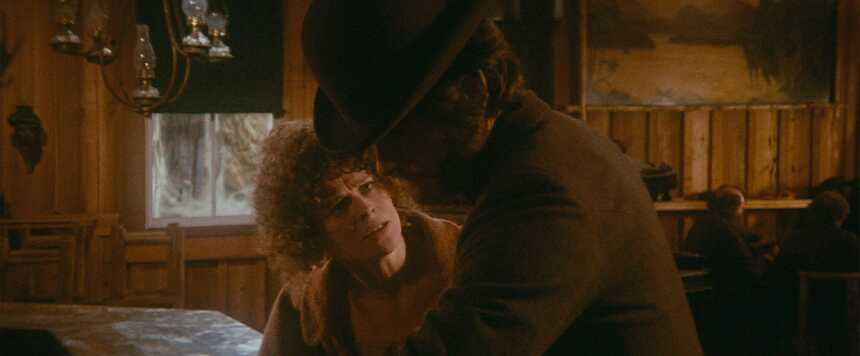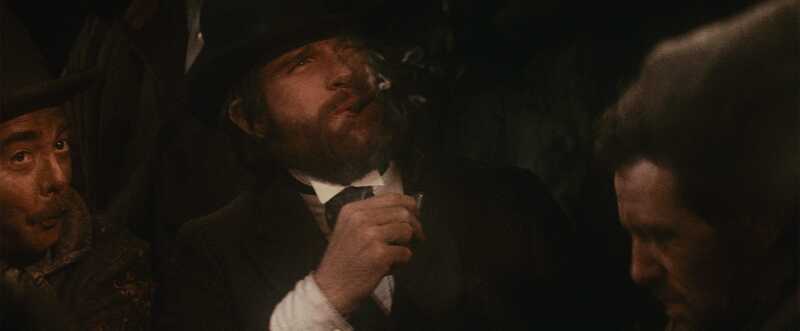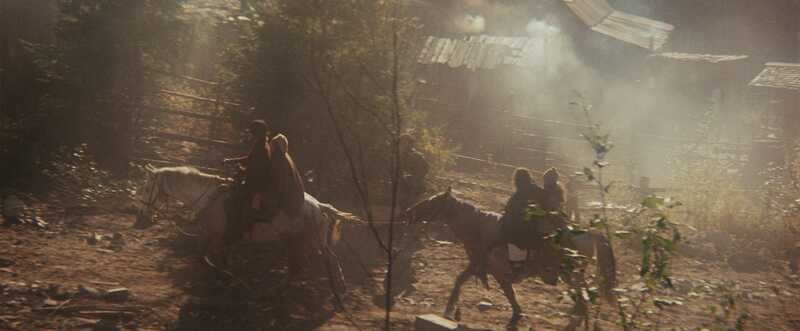MCCABE & MRS MILLER Blu-ray Review: Robert Altman's Frontier Western Remains a Masterpiece

Part of both the New Hollywood era and the second wave of Westerns, Robert Altman's McCabe & Mrs Miller might have suffered from poor box office on its release, but luckily did not have to wait long to find its revival audience. Alongside films such as Heaven's Gate and Days of Heaven, it was a story that took a different look at the frontier, one that set aside the usual white hat/black hat gun-totting adventures in search of what life was like for the ordinary people who built and worked the towns and land (and driving out the indigenous population). Criterion's re-release of their earlier edition of this film now includes a 4K restoration, alongside the blu-ray.
Based on the novel by Edmund Naughton, McCabe (Warren Beatty) is a man whose (perhaps falsely earned) reputation preceeds him into the barely-established town of Presbyterian Church, in Pacific Northwest. He has dreams of big business to come as the area populates with miners and lumberjacks - he starts to build a bar and gambling saloon, and tries to manage a few prostitutes. But he doesn't quite know what he's doing - until along comes Mrs. Miller (Julie Christie). She calls herself a whore, and knows the businessm convincing McCabe to incest money in creating teh kind of whore house that people will come miles to frequent - and indeed, they do, generating the business McCabe had only dreamed of. That is, until more moneyed people want a piece of the pie.
This is less of an anti-western, than an 'other' western. There was little glamorous or sexy about the lives of the people of Presbyterian Church. These are the itinerant workers, brought in to dig and mine for resources, or cut trees; they lived in tents and filthy rooming houses; their meals were simply, and there was little do with their spare time other than drink, play cards, and pay for sex. There probably wouldn't be anyone to miss them if they died. That's where communities like this would band together, since they had no one else to count on, and still their lives were often worth little to those who still had control.
But this is also the story of one man and one woman. McCabe, who think he knows this world and how to control it - but soon finds there is much to learn from an unlikely source. Beatty is playing against type (this was the height of his fame as a playboy and movie star), or perhaps showing what's underneath his type - someone whose charm can only carry him so far, whose ego and hubris will be his undoing, even as he tries to forge emotional connection. Christie also plays a little against type, a Cockney whore who has found herself in this backwater, doing the only thing she knows how and trying to get some semblance of control over her existence, even as she slides into addiction.
The film has so much of what we now understand as signature Altman - the ensemble cast, with each character almost feeling like they had a whole history written out for them - they add to the life behind the protagonists, we hear their conversation and understand this is part of the flavour of the story. In a place like Presbyterian Church, with so few people, every conversation is part of the whole. Likewise, it exudes the warmth of the fresh wood, the wool blankets, the fire-warmed water of the bathhouse, while at the same time we can taste the cold of the snow, touch the squelch of the mud under permanently-dirty boots.
Indeed, while the final twenty minutes of the slow-moving shoot out in the snow is brilliantly done, this is juxtaposed against the community coming together to put out the fire in the church. That church where the inside is still under construction and not in use, seemingly religion has little place in a town called Presbyterian Church, and yet the people must band together, worker and bartender and whore alike. Even as the bloody work of petty control plays out, the community must find a way to survive.
Even 50 years later, McCabe & Mrs. Miller not only holds up, but could still be seen as relevant, with the needs and wants of the ordinary person, even the small business owner, pitted against power and money that will sadly win out just because it has that power and money. And it still looks gorgeous, and inventive in its cinematography, sets, and actors whom each form an integral part of its tapestry.
Special Features
Much to the chagrin (to put it mildly) of the studio, Altman partially exposed many of the negatives of McCabe & Mrs Miller - but the result was a print that looks like an antique photo, slightly sepia-toned and worn. In other words, it looks like it could have been filmed in the 19th century. Both the 4K and the blu-ray disc retain that visual aesthetic, which is vital. They also have kept the unique sound mix in which you hear the mundane conversations happening around the main characters - just as they would have.
I began my view of the special features by reading Nathaniel Rich's essay, while looking through the photo gallery of stills from the set, by Steven Shapiro. This made for a great introduction to the history of the film and its place in Altman's oeuvre, and its importance in the New Hollywood renaissence. There's a discussion between film historians Cari Beauchamp and Rick Jewell, discussing how the film fits into a genre category - frontier film, neo-western, a demythologized western, take your pick. There's a good discussion of Altman's history as a television director, especially on western genre shows, and how that informed his perspective.
A 2016 documentary 'Way Out On a Limb' features casting director Graeme Clifford, script supervisor Joan Tewkesbury (who also had a small role as the hotel receptionist), and actors René Auberjonois and Michael Murphy, all giving their views on Altman and the creation of the film. Seeing it as more a frontier film than a western, they note how Altman wanted to tilt the genre, as he had tilted the war movie with his previous feature M*A*S*H. While each provides insight from their work area, there's also wonderful trivia - such as the fact that it was shot almost entirely in script order, as the town was literally being built by set construction as they were filming - to the point where the crew wore period costumes so they work could always be on going (and many of the crew slept in these half-made buildings. Or Murphy describing how the only notes he got on his character from Altman, was that he was 'somebody's nephew' - but that was all Murphy needed to constuct a whole character.
There are two other interviews with key artists: first with cinematographer Vilmos Zsigmond a craftsman whose work on films such as this and The Deer Hunter, The Long Goodbye, and Close Encounters of the Third Kind, to name a few, show the breadth of his work. But this was arguably his first big epic, and he discusses his collaboration with Altman, how he worked to create that look of authenticity (beyond just negative exposure), how Altman and he worked to make it feel authentic, or as authentic as it could be, in that Canadian wilderness. Likewise, a talk from 199 with production designer Leon Erickson, from a screening at the Guild Film Society, shows rare praise for this position and how essential Erickson's care with his job was to the feel of the film.
Finally, there are two segments from the Dick Cavett Show. The first with legendary film critic Paulione Kael. She was one of the few critics at the time who loved the film, and she took time to not only talk about what makes McCabe & Mrs Miller great, but why she thinks it was overlooked by critics, and the problem of untimely negative criticism. The second is with Altman himself, and while he discusses the film, the three best takeways was his comment that Warren Beatty really wanted to be President; that there was a baby born on set during filming; and that one of the coffins was used by two crew members who wanted to bury their grandmother, but couldn't afford the cost.
McCabe & Mrs. Miller
Director(s)
- Robert Altman
Writer(s)
- Edmund Naughton
- Robert Altman
- Brian McKay
Cast
- Warren Beatty
- Julie Christie
- Rene Auberjonois









